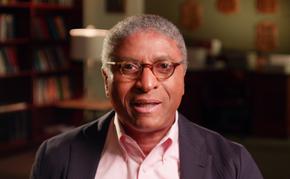The views expressed in our content reflect individual perspectives and do not represent the authoritative views of the Baha'i Faith.
Baha’is believe that women have a crucial role to play in the ultimate abolition of war, based on a speech by Abdu’l-Baha presented on May 7, 1912 at the Schenley Hotel in Pittsburgh.
Let’s examine how Baha’is regard Abdu’l-Baha and his writings and pronouncements, before presenting further reflections on the equality of women as Baha’i principle and prophecy.
Whatever Abdu’l-Baha said and wrote may be considered an extension of Baha’u’llah’s writings, to the extent that Abdu’l-Baha was gifted with intimate and profound knowledge of Baha’u’llah’s prophetic genius — so much so that, according to the Guardian of the Baha’i Faith, Shoghi Effendi, “His [Abdu’l-Baha’s] words are not equal in rank, though they possess an equal validity with the utterances of Baha’u’llah.”
RELATED: Imagine a World With Equality Between Women and Men
To illustrate this, let’s look at the following discourse by Abdu’l-Baha, as it relates to women’s equality as a key principle and prophecy of Baha’u’llah, contained in a tablet revealed by Abdu’l‑Baha in Paris on August 28, 1913:
In this Revelation of Baha’u’llah, the women go neck and neck with the men. In no movement will they be left behind. Their rights with men are equal in degree. They will enter all the administrative branches of politics. They will attain in all such a degree as will be considered the very highest station of the world of humanity and will take part in all affairs. Rest ye assured. Do ye not look upon the present conditions; in the not far distant future the world of women will become all-refulgent and all-glorious, For His Holiness Baha’u’llah Hath Willed It so! At the time of elections the right to vote is the inalienable right of women, and the entrance of women into all human departments is an irrefutable and incontrovertible question. No soul can retard or prevent it.
Abdu’l-Baha was quite emphatic about this, not only that women’s rights, as a matter of principle, are “equal in degree” with those of men, but that, as a matter of prophecy, “in the not far distant future the world of women will become all-refulgent and all-glorious.” Abdu’l-Baha further wrote:
When the women attain to the ultimate degree of progress, then, according to the exigency of the time and place and their great capacity, they shall obtain extraordinary privileges. Be ye confident on these accounts. His Holiness Baha’u’llah has greatly strengthened the cause of women, and the rights and privileges of women is one of the greatest principles of Abdu’l‑Baha. Rest ye assured! Erelong the days shall come when the men addressing the women, shall say: “Blessed are ye! Blessed are ye! Verily ye are worthy of every gift. Verily ye deserve to adorn your heads with the crown of everlasting glory, because in sciences and arts, in virtues and perfections ye shall become equal to man, and as regards tenderness of heart and the abundance of mercy and sympathy ye are superior.”
Here, not only are “the rights and privileges of women … one of the greatest principles of Abdu’l‑Baha,” but, as a matter of Baha’i prophecy, “in sciences and arts, in virtues and perfections ye [women] shall become equal to man.” Notwithstanding the fact that “the entrance of women into all human departments is an irrefutable and incontrovertible question” and that “No soul can retard or prevent it,” the timing is not specified.
Although we can now see a certain inevitability to this prophecy of the future – the full equality of women and men – the timing is not a foregone conclusion, for the simple reason that the fulfillment of this prophecy depends on time and circumstance. The conditions for its fulfillment, after all, must be right and ripe. Prophecies are not fulfilled automatically, nor are they self-executing. With this understanding in mind, it is important to consider the principle and prospect of actually accelerating, or hastening, the fulfillment of this world-transforming prophecy, by playing our respective roles in contributing to the progress of the advancement of women in all spheres of human endeavor, is essential.
RELATED: Does Patriarchy Also Harm Men?
From another perspective, the equality of women and men forms a kinetic dynamic of our social evolution. The future of the world’s peace and prosperity absolutely depends on the ideal and progressive role of women in all realms of society. Baha’u’llah’s principle of the equality of women and men should also be considered to be a major (albeit unrecognized) socio-moral force in propelling forward the social evolution of our planet.
Incontrovertible evidence establishing that the equality of women with men, as a matter of principle, is one of the foundational and fundamental and foremost teachings of Baha’u’llah, can be found in this statement from a tablet written by Baha’u’llah:
Exalted, immensely exalted is He Who hath removed differences and established harmony. Glorified, infinitely glorified is He Who hath caused discord to cease, and decreed solidarity and unity. Praised be God, the Pen of the Most High hath lifted distinctions from between His servants and handmaidens, and, through His consummate favours and all-encompassing mercy, hath conferred upon all a station and rank of the same plane. He hath broken the back of vain imaginings with the sword of utterance and hath obliterated the perils of idle fancies through the pervasive power of His might.
So it is perfectly clear that Baha’u’llah has “lifted distinctions from between His servants [men] and handmaidens [women]” and “conferred upon all a station and rank of the same plane,” meaning that the principle of the equality of women and men is now “in force” in the operative sense, here and now, even though its application to society is a progressive process that will take time and effort to fully bring about. In another tablet, Baha’u’llah wrote:
In this Day the Hand of divine grace hath removed all distinctions. The servants of God and His handmaidens are regarded on the same plane. Blessed is the servant [man] who hath attained unto that which God hath decreed, and likewise the leaf [woman] moving in accordance with the breezes of His will. This favour is great and this station lofty.
RELATED: Women: An Antidote for War
In the evening of June 19, 1913, Abdu’l-Baha addressed an enthusiastic crowd under a tent pitched on the roof of the Hotel Sultani in Port Said, Egypt. This important discourse occurred just after his travels across America and Canada in 1912 and in several countries in Europe in 1913, which had recently concluded. In this provisional translation of his talk by Adib Masumian, while reflecting on the generally favorable receptivity of his Western audiences, Abdu’l-Baha put the principle of the equality of women and men — in the context of the world’s religious history — in an interesting, dramatic, and even poetic way:
Now praised be God that the East is illumined and the West perfumed! When we were departing Ṭihran for Baghdad, there was not a single believer along the way. On this journey, however, whichever city in the West we passed through, we found Baha’is there. In places that had not heard it before — such as Denver, Dublin, Buffalo, Boston, Brooklyn, Montclair, Montreal, and so on — the call of God was raised:
No tumult in the town or city’s there
But for the curling lock of the Friend’s hair
No stir in all the world does one find now
Except the curve of that Companion’s browThe call of God was raised in such a way that every ear relished it — every soul was stirred by it and every mind astonished at it — inquiring, “What call is this that has been raised? What star is this that is rising?” One soul would be astounded, another would investigate, and yet another would adduce proofs. They would all declare that the teachings of Baha’u’llah are truly without peer — that they are the spirit of this age and the light of this century.
At most, one would object that the Gospel includes similar teachings, to which we would reply, “Among these teachings is the oneness of humanity; in which of the Books [of the New Testament] can this be found? Show us! And universal peace — in what Book is this written? And that religion must be the cause of love and fellowship, and that without these the lack of religion would be preferable — in which Book is this stated? And that religion must accord with sound reason and accurate science — in what Book is this mentioned? And equality between men and women — in which Book does one find this? And the abandonment of sectarian, religious, national, political, and racial prejudices — what Book contains this?” And so on and so forth.
It’s a good question: “And equality between men and women — in which Book does one find this?”
Abdu’l-Baha’s “rhetorical question” gives pause for thought, prompting us to try to find the answer for ourselves. In the history of ideas, there may be vestiges or hints of this principle of the equality of women and men in the sacred texts of the great world religions, but finding them would not be an easy task. Certainly this principle is without precedent in the history of religions to the extent that it is presented as a paramount topic of profound social and spiritual importance.

















Comments
Sign in or create an account
Continue with Facebookor